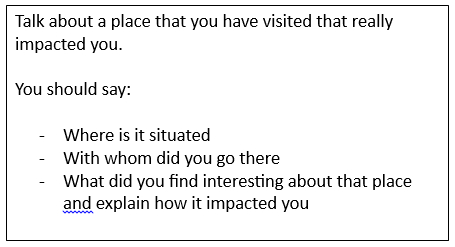WHAT IS THE FORMAT OF IELTS SPEAKING TEST?
The IELTS Speaking test is same for both Academic and General training so, they follow the same format. The test is divided into three parts and lasts for about 11-14 minutes.
PART 1 - In this part, the examiner will introduce himself/herself to you and will check your identity. Then the examiner will ask you some common questions.
For example: questions related to you, your life, your work, studies, home, family, friends, hobbies, interests, lifestyle, likes and dislikes etc. This part usually takes about 4-5 minutes. When answering questions in this part, do not just provide one-word answer or very short answers. Give a bit more information through your answers so that you can put forward your thoughts, reasons, and choices more clearly and effectively but at the same time do not overextend your answers too.
PART 2 - In this part, the examiner will give you a topic to speak on that will be written on a card. There will also be some points mentioned in that card that you should include in your topic. You will be given 1 minute to prepare, along with a pencil and a paper to make some notes during your preparation time. You are then required to speak on the topic for about 2 minutes.
You can get any topic to speak on, however, usually you get topics that you are familiar with and are related to you and your life in some or the other way.
For example: you may be asked to talk about your favourite sport, favourite picture, memorable event in your life, a leader you look up to, an experience that changed your life, etc.
Once, the 2-minute time is over, the examiner will ask you to stop. Then the examiner may ask you a couple of questions related to that topic. This part lasts for about 3-4 minutes.
PART 3 - In this part, the examiner will be asking you some questions that are going to be generically and conceptually related to the topic given in Part 2 of the test. You will have the chance to elaborate and provide a more general expression of your ideas, opinions, and viewpoints through these questions.
This part takes about 4-5 minutes.



